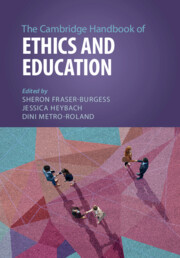Book contents
- The Cambridge Handbook of Ethics and Education
- The Cambridge Handbook of Ethics and Education
- Copyright page
- Epigraph
- Contents
- Figures
- Tables
- Contributors
- Foreword
- Preface
- Acknowledgments
- Part I Traditions in Ethics and Education
- Part II Ethics and Education in Practice
- Part III Emerging Ethical Pathways and Frameworks
- Index
- References
Part II - Ethics and Education in Practice
Perennial Dilemmas
Published online by Cambridge University Press: 07 March 2024
- The Cambridge Handbook of Ethics and Education
- The Cambridge Handbook of Ethics and Education
- Copyright page
- Epigraph
- Contents
- Figures
- Tables
- Contributors
- Foreword
- Preface
- Acknowledgments
- Part I Traditions in Ethics and Education
- Part II Ethics and Education in Practice
- Part III Emerging Ethical Pathways and Frameworks
- Index
- References
Summary
This part of the handbook takes up the role of ethics and education in practice and the perennial problems associated with the nonideal, often messy, circumstances of power and (in)equality associated with institutions of education. Although not all applications of ethics in education are rooted in the dilemmas of institutions, a great many result from clashing values that occur between the private individual and institutions of modern schooling. Perennial questions taken up in this part include: What happens when ethics become institutionalized? What are the aims and purposes of school? What knowledge is of most worth? How should we treat students? How do diverse populations experience schooling? How should teachers be educated, trained, and/or developed? What is the role of private interests in public schooling? How can liberal commitments to schooling foster a more humane and just future?
- Type
- Chapter
- Information
- The Cambridge Handbook of Ethics and Education , pp. 301 - 592Publisher: Cambridge University PressPrint publication year: 2024

